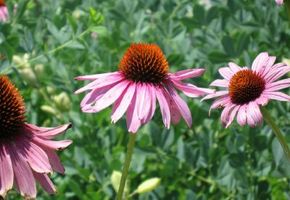First of all, to prevent warts, it is important to boost immune function. Base your diet on whole grains and fresh garden produce, eat only small amounts of simple sugars, and get plenty of rest. The body makes certain immune factors only when you're sleeping.
The main immune-boosting herb that has been clinically studied is echinacea. Others include licorice, goldenseal, and elderberry; all can be taken internally. Echinacea is quite safe to use for extended periods in certain severe immune problems, although some falsely advise to only use it for short periods.
The allium family helps do away with the actual wart. Crush a clove of garlic and tape a small amount of it to the growth. Protect surrounding skin to avoid blistering. Alternatively, cut an onion in half, hollow out one side, and fill with salt. As the salt draws the juice out of the onion, use the liquid to paint the wart several times a day.
A chunk of aspirin taped to the wart will produce the same effect. Herbs rich in salicylic acid, the active ingredient in aspirin, may be helpful, too. Mash fresh yarrow and apply it to the wart.
Another herb that diminishes the unwanted growth is fresh dandelion. Break a dandelion stem or leaf and apply the white sap to the wart.
Whichever herb you choose, very common varities -- some find right in your garden -- can help you heal warts upon their arrival, and a healthy diet can help you prevent future warts from ever appearing.
